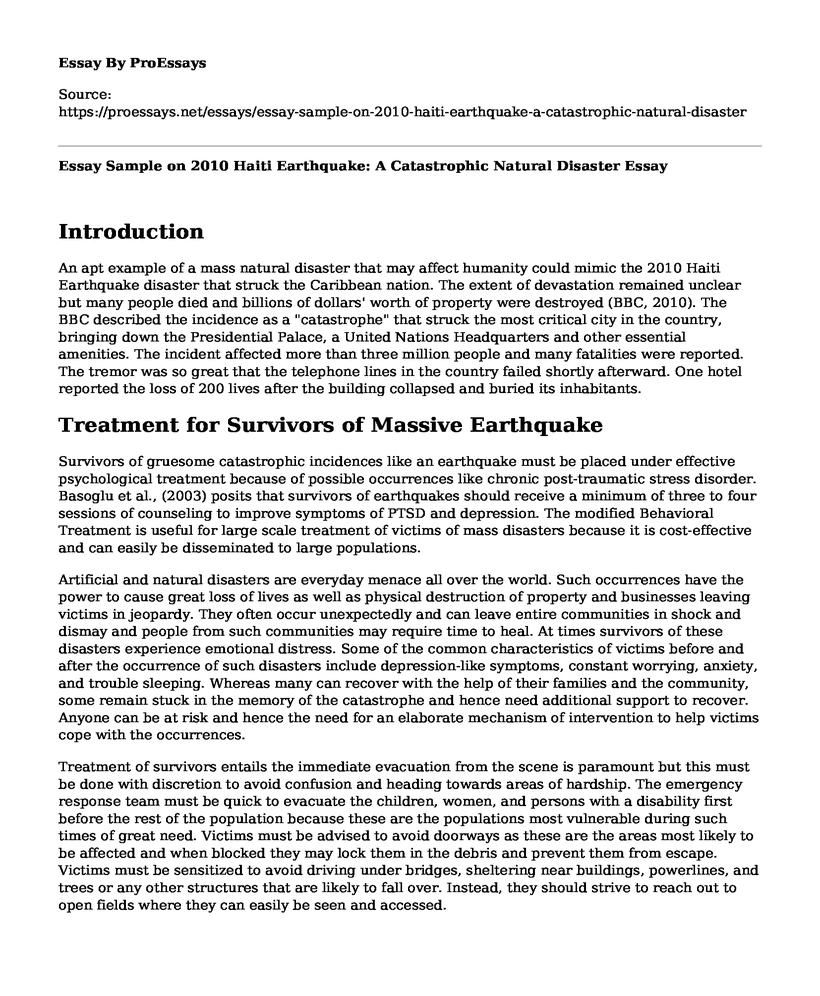Introduction
An apt example of a mass natural disaster that may affect humanity could mimic the 2010 Haiti Earthquake disaster that struck the Caribbean nation. The extent of devastation remained unclear but many people died and billions of dollars' worth of property were destroyed (BBC, 2010). The BBC described the incidence as a "catastrophe" that struck the most critical city in the country, bringing down the Presidential Palace, a United Nations Headquarters and other essential amenities. The incident affected more than three million people and many fatalities were reported. The tremor was so great that the telephone lines in the country failed shortly afterward. One hotel reported the loss of 200 lives after the building collapsed and buried its inhabitants.
Treatment for Survivors of Massive Earthquake
Survivors of gruesome catastrophic incidences like an earthquake must be placed under effective psychological treatment because of possible occurrences like chronic post-traumatic stress disorder. Basoglu et al., (2003) posits that survivors of earthquakes should receive a minimum of three to four sessions of counseling to improve symptoms of PTSD and depression. The modified Behavioral Treatment is useful for large scale treatment of victims of mass disasters because it is cost-effective and can easily be disseminated to large populations.
Artificial and natural disasters are everyday menace all over the world. Such occurrences have the power to cause great loss of lives as well as physical destruction of property and businesses leaving victims in jeopardy. They often occur unexpectedly and can leave entire communities in shock and dismay and people from such communities may require time to heal. At times survivors of these disasters experience emotional distress. Some of the common characteristics of victims before and after the occurrence of such disasters include depression-like symptoms, constant worrying, anxiety, and trouble sleeping. Whereas many can recover with the help of their families and the community, some remain stuck in the memory of the catastrophe and hence need additional support to recover. Anyone can be at risk and hence the need for an elaborate mechanism of intervention to help victims cope with the occurrences.
Treatment of survivors entails the immediate evacuation from the scene is paramount but this must be done with discretion to avoid confusion and heading towards areas of hardship. The emergency response team must be quick to evacuate the children, women, and persons with a disability first before the rest of the population because these are the populations most vulnerable during such times of great need. Victims must be advised to avoid doorways as these are the areas most likely to be affected and when blocked they may lock them in the debris and prevent them from escape. Victims must be sensitized to avoid driving under bridges, sheltering near buildings, powerlines, and trees or any other structures that are likely to fall over. Instead, they should strive to reach out to open fields where they can easily be seen and accessed.
Conclusion
Overall, surviving natural disasters like the 2010 Haiti Earthquake can be utterly catastrophic. Such events have been known to claim thousands of lives and billions of dollar's worth of losses in short periods. Such incidences occur abruptly and hence prior preparation and knowledge about how to behave are essential when approaching them. Victims must strive to stick together in open places away from areas and situations that may put their lives in danger.
References
Basoglu, M., Livanou, M., Salcioglu, E., & Kalender, D. (2003). A brief behavioral treatment of chronic post-traumatic stress disorder in earthquake survivors: results from an open clinical trial. US National Library of Medicine, 33(4), 647-54.
BBC. (2010). A massive 7.0-magnitude earthquake has struck the Caribbean nation of Haiti. Retrieved from http://news.bbc.co.uk/2/hi/8455629.stm
Wei-Haas, M. (2019). Earthquake safety tips. Retrieved from https://www.nationalgeographic.com/environment/natural-disasters/earthquake-safety-tips/
Cite this page
Essay Sample on 2010 Haiti Earthquake: A Catastrophic Natural Disaster. (2023, Feb 09). Retrieved from https://proessays.net/essays/essay-sample-on-2010-haiti-earthquake-a-catastrophic-natural-disaster
If you are the original author of this essay and no longer wish to have it published on the ProEssays website, please click below to request its removal:
- Environmental Pollution Analysis
- The Impact of Climate Change on Winter Tourism in the Swiss Alps
- The P2 Program Developed by the University of Houston
- The Relationship Between Weathering, Erosion and Transportation - Research Paper
- FDR's Impact on National Parks: Protecting the Nation's Environment - Essay Sample
- Essay Sample on U.S. Waste Production: Why Recycling Matters & How to Do It Better
- Recycling: A Need for Accurate Processes to Protect Environment - Essay Sample







